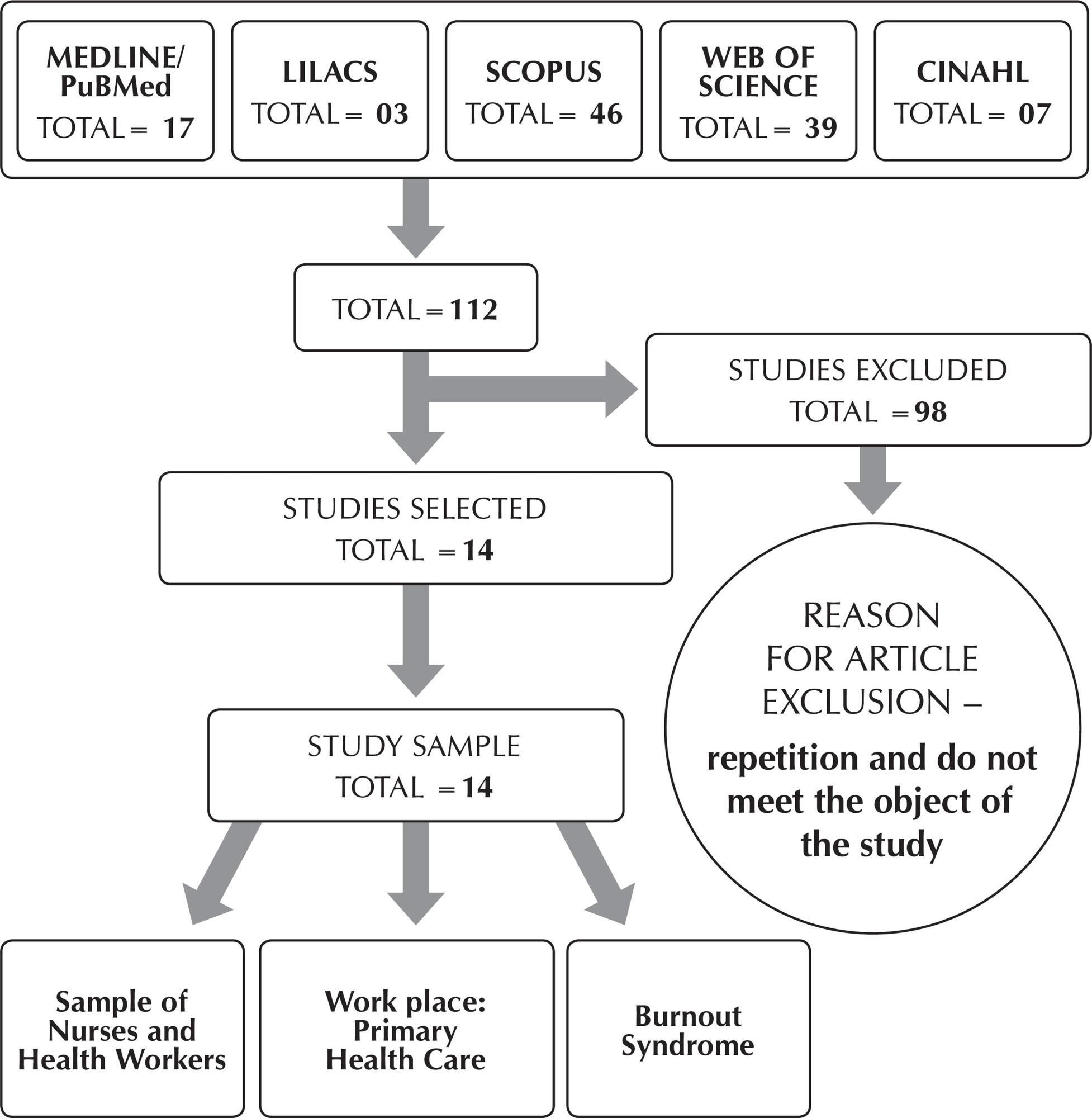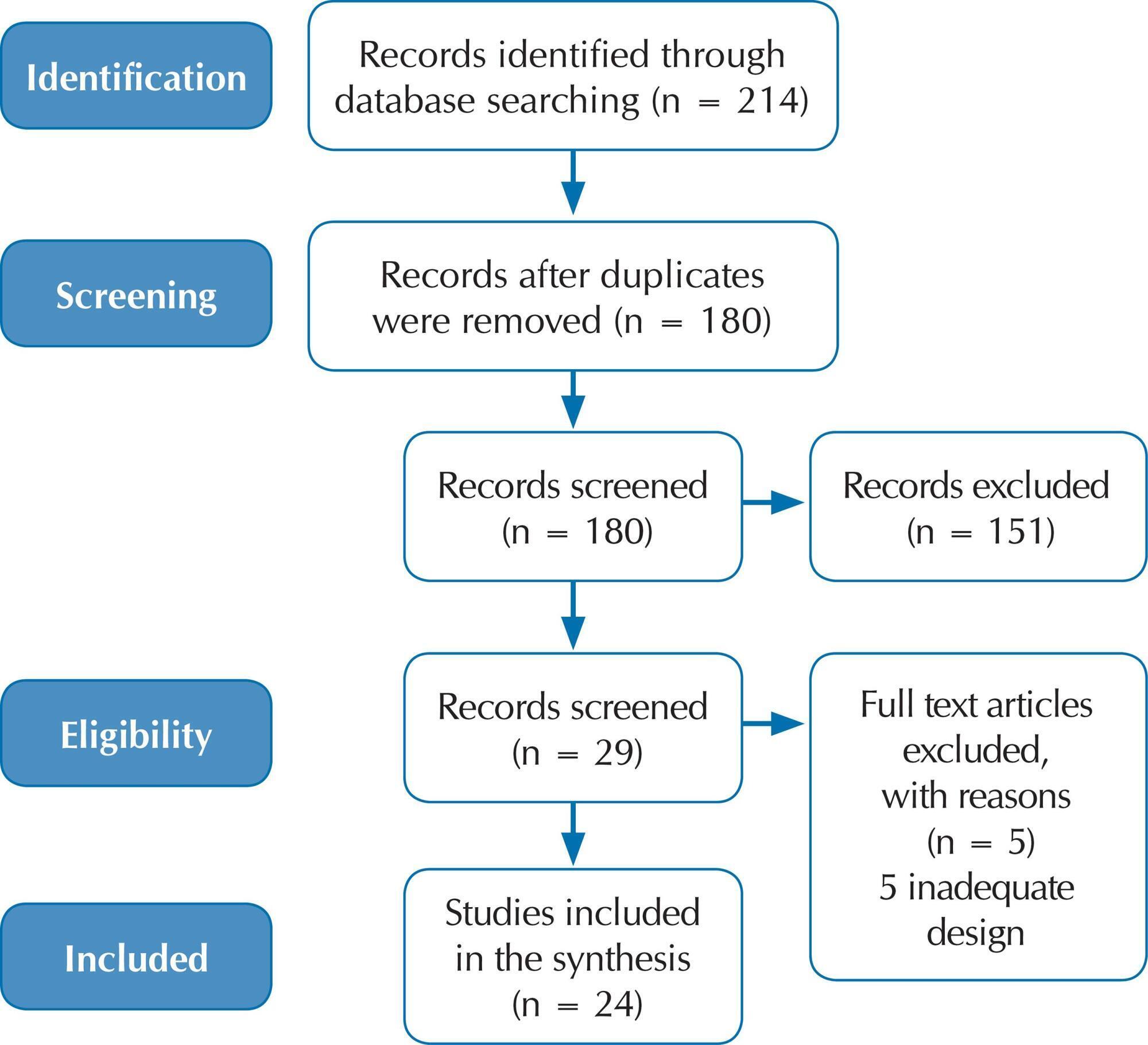-
ERRATUM01-01-2018
ERRATUM
Revista Brasileira de Enfermagem. 2018;71:2348-2348
Abstract
ERRATUMERRATUM
Revista Brasileira de Enfermagem. 2018;71:2348-2348
DOI 10.1590/0034-7167.201871suppl5e01
Views0Article “Teachers’ experiences about first aid at school”, with number of DOI: http://dx.doi.org/10.1590/0034-7167-2017-0715, published in the journal Revista Brasileira de Enfermagem, v71(suppl 4):1678-84, on page 1678: Where it read: […]See more -
REFLECTION01-01-2018
For a public policy of surveillance of suicidal behavior
Revista Brasileira de Enfermagem. 2018;71:2343-2347
Abstract
REFLECTIONFor a public policy of surveillance of suicidal behavior
Revista Brasileira de Enfermagem. 2018;71:2343-2347
DOI 10.1590/0034-7167-2018-0256
Views0See moreABSTRACT
The object is to reflect on the need for effective implementation of a surveillance program of suicidal behavior and of the causal and intervening factors of suicide, as well as to training and qualification of health professionals about this topic, and the profile of the individual with suicidal behavior. Suicidal behavior is public health serious, global problem and it should be faced in a consensual way by public administrators, professionals and population. Suicide is a real, current catastrophe and a kind of death that can be avoided.
-
REVIEW01-01-2018
Indicators of burnout in Primary Health Care workers
Revista Brasileira de Enfermagem. 2018;71:2334-2342
Abstract
REVIEWIndicators of burnout in Primary Health Care workers
Revista Brasileira de Enfermagem. 2018;71:2334-2342
DOI 10.1590/0034-7167-2017-0530
Views1See moreABSTRACT
Objective:
to analyze the indicators of burnout peculiar to health workers from units of Primary Health Care.
Method:
integrative review of the literature structured in the stages: guiding question; search; categorization of studies; assessment; discussion; and interpretation of results, and synthesis of knowledge. Search for original articles and reviews published from 2000 to 2016, in Portuguese, English and Spanish, in the main databases of the health area. Descriptors used: Nursing, Burnout and Primary Health Care.
Results:
14 articles met the proposed inclusion criteria, six (42.85%) presented a sample of nurses and eight (57.15%) health professionals.
Conclusion:
Primary Health Care workers are exhausted due to inadequate working conditions characterized by the lack of human and physical resources that leads to work overload, workplace violence and difficulty with teamwork, despite being satisfied with the work environment.

-
REVIEW01-01-2018
Spirituality review on mental health and psychiatric nursing
Revista Brasileira de Enfermagem. 2018;71:2323-2333
Abstract
REVIEWSpirituality review on mental health and psychiatric nursing
Revista Brasileira de Enfermagem. 2018;71:2323-2333
DOI 10.1590/0034-7167-2016-0429
Views0See moreABSTRACT
Objective:
Gather the concepts, theories and interventions about spirituality, its nature and functions in mental health and psychiatric nursing.
Method:
A literature review proceeded on February 2016. It has integrated 214 studies published until December 2015 by crossing Spirituality and Psychiatric Nursing mesh terms in databases.
Results:
Conceptualization about spirituality and religion, their complexity in nursing research, education, and clinical approach; their functions to human being correlated to the purpose of life, transcendental connections, and support in mental health; the professional boundaries in address to spirituality in mental health scenery, and a descriptive literature recommendations and a instruments catalog.
Conclusions:
Spirituality in nursing mental health and psychiatry remains a theoretical problem, and has a clinical mischaracterized approach; recently publications try to promote a human and holistic trend in the practice, as a challenge to lead the current circumstances to valid nursing bases.

-
01-01-2018
Revisão de espiritualidade em enfermagem de saúde mental e psiquiatria
Revista Brasileira de Enfermagem. 2018;71:2323-2333
Abstract
Revisão de espiritualidade em enfermagem de saúde mental e psiquiatria
Revista Brasileira de Enfermagem. 2018;71:2323-2333
DOI 10.1590/0034-7167-2016-0429
Views0See moreRESUMEN
Objetivo:
Reunir los conceptos, teorías e intervenciones sobre la espiritualidad, su naturaleza y funciones en la salud mental y la enfermería psiquiátrica
Método:
En febrero de 2016 se realizó una revisión de la literatura. Se han integrado 214 estudios publicados hasta diciembre de 2015 mediante el cruce de los términos de la malla de Espiritualidad y Enfermería Psiquiátrica en las bases de datos.
Resultados:
Conceptualización sobre espiritualidad y religión, su complejidad en la investigación, la educación y el enfoque clínico de la enfermería; sus funciones para el ser humano se correlacionan con el propósito de la vida, las conexiones trascendentales y el apoyo en la salud mental; los límites profesionales en dirección a la espiritualidad en el escenario de salud mental, y recomendaciones descriptivas de literatura y un catálogo de instrumentos.
Conclusión:
La espiritualidad en la salud mental y la psiquiatría de la enfermería sigue siendo un problema teórico y tiene un enfoque clínico mal caracterizado. Recientemente, las publicaciones intentan promover una tendencia humana y holística en la práctica, como un desafío para llevar las circunstancias actuales a bases de enfermería válidas.
-
RESEARCH01-01-2018
Safety culture: perception of health professionals in a mental hospital
Revista Brasileira de Enfermagem. 2018;71:2316-2322
Abstract
RESEARCHSafety culture: perception of health professionals in a mental hospital
Revista Brasileira de Enfermagem. 2018;71:2316-2322
DOI 10.1590/0034-7167-2018-0125
Views0See moreABSTRACT
Objective:
To evaluate the culture of patient safety in a mental health service.
Method:
Cross-sectional study conducted with health professionals in a mental hospital, by applying the Safety Attitudes Questionnaire (SAQ). Descriptive and inferential analyses were performed.
Results:
One-hundred and three professionals participated in the study, with female predominance (64.1%) and time of performance equal to or greater than 21 years (32.4%). The nursing professionals of technical level and with statutory work regime were the most participative, 54.4% and 52% respectively. The total score was 69 points. The domain that reached the highest score was Job satisfaction (80 points) and the lowest was Working conditions (57 points). The statutory professionals and those with longer professional experience obtained better scores in the perception of safety culture.
Conclusion:
The result of safety culture was below the recommended, indicating the need for strengthening this construct in mental health hospitals.
-
RESEARCH01-01-2018
Meanings of flower therapy for anxiety in people with overweight or obesity
Revista Brasileira de Enfermagem. 2018;71:2310-2315
Abstract
RESEARCHMeanings of flower therapy for anxiety in people with overweight or obesity
Revista Brasileira de Enfermagem. 2018;71:2310-2315
DOI 10.1590/0034-7167-2018-0044
Views0See moreABSTRACT
Objective:
To understand the experience from the perspective of the participant of a clinical research, which had as intervention the flower therapy for anxiety of individuals with overweight and obesity.
Method:
qualitative study, developed by semi-structured interview with 42 participants from a clinical research and data submitted to content analysis.
Results:
after analysis, five thematic categories emerged: seeking natural alternatives to aid in control of anxiety and obesity; perceiving the benefits of flower therapy in itself and in family and professional relationships; recognizing flower therapy as source of tranquility and self-knowledge; perceiving changes in sleep quality; acquiring self-control and guidance on food and relational needs.
Final considerations:
the participants showed the intention of seeking natural alternatives to aid the control of anxiety and obesity, employing complementary therapies to strengthen their health. Consequently, participants reported self-control in feeding and in family and professional relationships.
-
RESEARCH01-01-2018
Effects of dance on the postural balance, cognition and functional autonomy of older adults
Revista Brasileira de Enfermagem. 2018;71:2302-2309
Abstract
RESEARCHEffects of dance on the postural balance, cognition and functional autonomy of older adults
Revista Brasileira de Enfermagem. 2018;71:2302-2309
DOI 10.1590/0034-7167-2017-0253
Views0See moreABSTRACT
Objective:
to evaluate the postural balance, cognition and functional autonomy of older adults with dementia, who are long-stay inpatients, subjected to ballroom dancing.
Method:
simple randomized clinical study. Older adult sample: control group (30) and experimental group (30). The groups were subjected to the protocol of functional autonomy for activities of daily living; to the assessment of cognition (mini-mental state examination); and to the analysis of postural balance (stabilometric and postural platforms). The analysis of variance with repeated measures for group and time factors, and Scheffé’s post hoc test were used, with significance of p < 0.05.
Results:
For the mini-mental state examination, the control group presented a 24.27 mean, and the experimental 22.75. Functional autonomy for activities of daily living – experimental: 54.47 ± 7.24 (p < 0.0001) x control: 61.77 ± 8.47 (p = 0.011). Postural balance – experimental: = 3.16 ± 3.44 (p = 0.02) x control = X = 6.30 ± 7.62 (p = 0.04).
Conclusion:
Ballroom dancing can be recommended for older adults to provide improvement in their balance and motor performance of the activities of daily living.

Search
Search in:
Nuvem de Tags
Adolescente (85) Atenção Primária à Saúde (239) COVID-19 (91) Criança (91) Cuidados de Enfermagem (269) Educação em Enfermagem (151) Educação em Saúde (139) Enfermagem (930) Enfermagem Pediátrica (86) Estudantes de Enfermagem (77) Estudos de Validação (131) Família (87) Idoso (208) Promoção da Saúde (99) Qualidade de Vida (104) Saúde do Trabalhador (86) Saúde Mental (145) Saúde Pública (82) Segurança do Paciente (150) Tecnologia Educacional (100)



